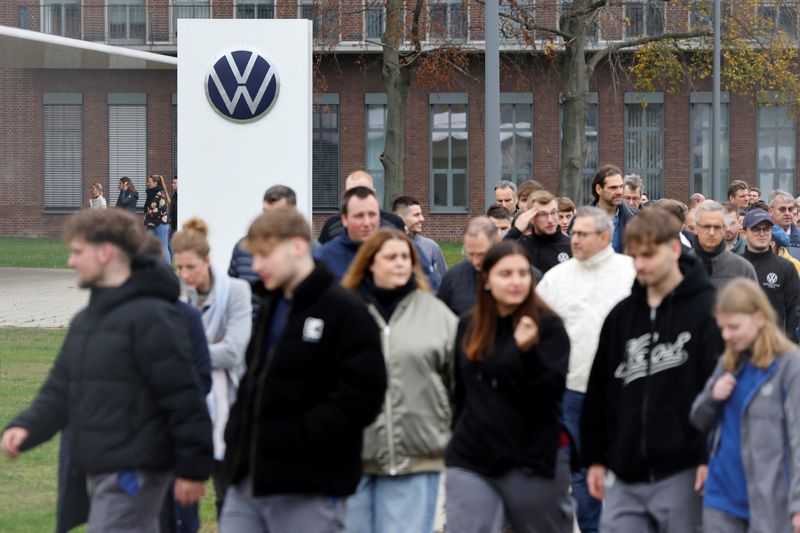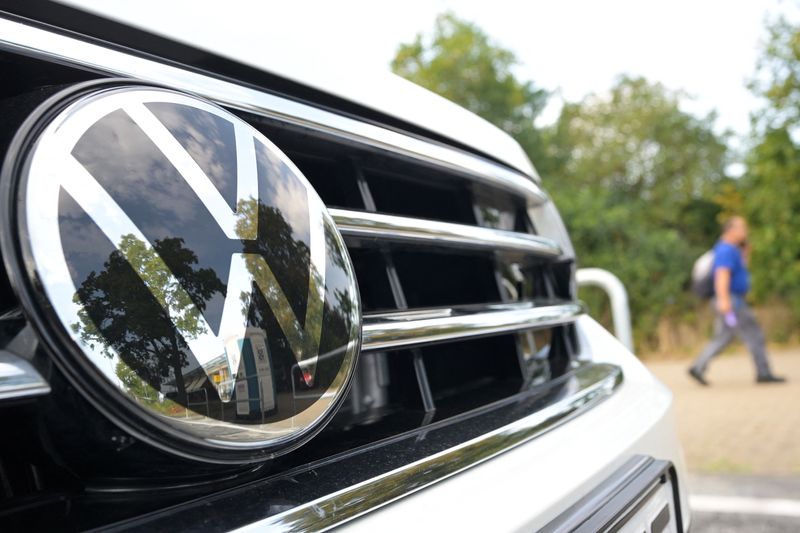By Christoph Steitz and Victoria Waldersee
FRANKFURT/BERLIN (Reuters) - Volkswagen (ETR:VOWG_p)'s plans to close plants in Germany and dissolve long-standing labour agreements with unions have put the spotlight on its unique governance and ownership structure that have drawn criticism from investors for years.
Like other German conglomerates, the 87-year-old automaker is the result of decades of expansion and strategy shifts, resulting in an empire that stretches from mass-market SEATs to luxury Lamborghinis, as well as stakes in sports car maker Porsche AG and trucks firm Traton.
WHAT'S THE VOLKSWAGEN LAW?
The strong influence of workers dates back to the early days of Volkswagen before World War Two, when the Nazis built Volkswagen's main factory in Wolfsburg with money that came in part from assets expropriated from trade unions.
This, and the use of forced labour, formed the financial basis of the company. After the war, the British, who were responsible for the plant at the time, decided to place trusteeship of the company in public hands.
To this day, the state of Lower Saxony, where Volkswagen is based and where it operates five of its six western German assembly plants, has a 20% voting stake.
In 1960, when the company was changed to a joint stock corporation, the so-called Volkswagen law was passed, handing significant influence to Lower Saxony and workers in a bid to protect the business from outside influence.
WHAT DOES IT SAY?
There are two critical clauses.
Decisions that normally require at least a three-quarters majority at the annual general meeting must be passed by more than four-fifths of Volkswagen shareholders, giving Lower Saxony a blocking minority.
Any decision to build or move a production plant also needs approval of a two-thirds majority in the 20-strong supervisory board, the law says, without specifically mentioning closures.
This means the 10 members on the board representing German labour can veto any far-reaching plans that affect factories.
WHAT'S VOLKSWAGEN'S OWNERSHIP STRUCTURE?
It's complicated, mainly because there are two different classes of Volkswagen shares: preferred stock that is listed in the German benchmark DAX index, and common stock which carries voting rights.
Most of the group's equity, covering both share classes, is owned by Porsche SE, the investment vehicle of the Porsche and Piech families, which holds a 31.9% stake in Europe's top carmaker.
The German state of Lower Saxony owns 11.8%, while Qatar holds 10%.
When it comes to voting stakes, however, the picture looks different: With a 53.3% voting stake, Porsche SE effectively controls Volkswagen. Lower Saxony has a 20% voting stake while Qatar owns 17% of votes.
WHAT'S THE GOVERNANCE SITUATION?
Volkswagen has drawn flak from investors for governance shortcomings that are partly related to its ownership structure, which hands Porsche SE effective control over the company even though it does not own a majority of all shares.

In addition, Oliver Blume is regularly under fire for being CEO of both Volkswagen and separately-listed Porsche AG, in which Volkswagen owns a 75.4% stake, with some investors saying one person cannot lead two big carmakers.
The resulting valuation discount has caused Volkswagen's shares to underperform the sector over past five years, with uncertainty over succession at the Porsche and Piech families - led by Wolfgang Porsche, 81, and Hans Michel Piech, 82 - adding to investors' wariness.
